| "It'd be a wonderful world if we were always at our best." |
| Detective Murcheson |
| "The battleline between good and evil runs through the heart of every man." |
| Alexander Solzhenitsyn |
Whenever I read film reviews growing up, I was always puzzled by the phrase "the kind of film they don't make anymore," which was invariably followed by some waxing lyrical about films the reviewer had watched or enjoyed in their youth, before lamenting the state of the contemporary film industry, and finally positioning the film in question a rebirth of something the reviewer considered lost, and their faith in cinema, or should I say mainstream cinema, was restored.
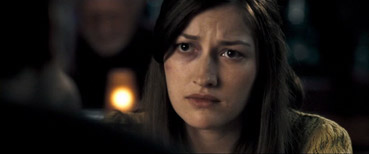
At that point in time, I didn't fully grasp the concept of how tribal film culture was (and still is) or that films are made to appeal to certain kinds of people and these choices often resulted in trends for particular films. Of course, these patterns, more often than not, are dictated by what's popular and financially bankable at any given point, rather than the idiosyncrasies of personal taste. Consequently, if you like something outside of those populist streams, then to the marketing men, sadly, you didn't exist. A combination of naïveity – I was still firmly of the belief that films were greenlit because of the stories they told, rather than the stars who were in them – and youthful arrogance saw to it that didn't really think about what it would mean if you found yourself marginalised because mainstream cinema didn't appeal to you. Ultimately, I just considered it to be tough luck; a nasty side-effect of progressive Hollywood dominance.
I turned into one of those people.
Increasingly disenchanted with Hollywood, and the films people my age were meant to like, I effectively turned by back on it and headed for alternate climbs, broadening my viewing habits in the process. I'd keep an eye on things, of course, and in doing so, I'd come to echo the statements of the critics I'd read in the past. All I could do cling to the faint hope that one day a director would make something that I didn't want to immediately run screaming from the cinema because of or burn every copy of it in existence because it was stupid/vapid/lazy/boring (delete as applicable). I wanted – and I didn't think it was that big of an ask to be perfectly honest – a film that I really connected with and meant something to me, that was as skilled and as enjoyable as the studio era Hollywood in its heyday. I wanted something to be a classic because it truly deserved to be, not because the marketing department was currently into selling nostalgia and wanted me to believe it.
All you can do, as it turns out, is wait.
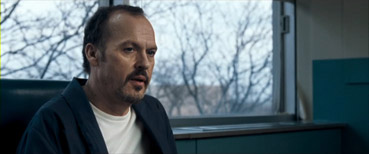
When you find a diamond amongst a lot of rough, you have to champion it, and hold it up to the light for all to see, because it could all too easily be ignored. Michael Keaton's directorial debut, The Merry Gentleman is one of those rare films, exactly the kind those nostalgic, lamenting reviewers were talking about and it's all the better for it. Given Keaton's penchant for loud, often maniacal characters, when I considered what his eventual directorial debut might look like, I'd always imagined something that was as bold and as bright as the characters he'd become famous for and with a fair amount of hype. Never did I imagine it would be something so stark, thoughtful or affecting. Fittingly, this Merry Gentleman arrived with little fanfare – aside from a Sundance premiere, where it was well received – and, has been doing the rounds quietly ever since, building a reputation and an audience of it's own without all the excess baggage and the often weighty expectation that a star name can bring. Luckily for Keaton, his talents extend beyond acting, and purely from the perspective of direction, this film is a surprise. All those years on set have clearly paid off.
As you may have guessed from the title (it's taken from the carol), the film is set around the festive period, extending all the way until just beyond Valentine's Day. However, there isn't a hint of the syrupy-sweet sentiment common to films which are set around the either date, let alone something that manages to incorporate both without falling victim to its sentimental trappings. If anything, they're antithetical to the holiday and romance film, since nothing here is neat, perfect or expected, even the characters themselves. This is a story, chiefly, of two lost souls, who find out they're very much kindred spirits, One is an ailing contract killer, Frank Logan (Michael Keaton), cool, calm and quiet – much like the register of the film itself – and the other is Kate Frazier (Kelly Macdonald, talking in her native accent), a charming, kind woman, stifled by her oppressive, abusive husband Michael (Bobby Carnivale). Recovering from his latest beating, Kate finds the strength to leave him, and make a new life for herself in Chicago, in the hopes of leaving her past well and truly behind.
Initially, I wondered how these two were going to meet, since their worlds seemed polls apart, but odd couples like these are what cinema is for, and what cinema is best at portraying. Even at this early stage, Ron Lazzeretti's script (this is only his second feature-length film, after The Opera Lover), shows it's strength, by setting up the interplay between audience knowledge and character knowledge. All the way through this film, we're in the position of privilege, since we know more than everyone else involved at any given time, which makes watching all the pieces fit that little bit more enjoyable. To my relief, that process would be far from tedious, since how those irregular, complex little pieces come to fit is far from predictable.
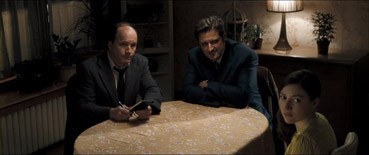
Up on a roof, in the midst of carrying out his latest contract, Frank scans his surroundings with the scope of his gun, catching sight of Kate in the crosshairs, as she chats with her colleague Diane (a wonderful Darlene Hunt), and we realise she works in the same law office as the man he's been sent to kill. Like a lot of moments in this film, things that should be dark and disconcerting are given a strange sense of beauty. Even though it's clear what Frank will do, you can't help but be momentarily enthralled by the sight of Kate, mimicking the pose of a statue she saw whilst visiting a local church. Likewise, Kate's first look at Frank has a similar feel. Having completed his latest hit, Frank remains up on the roof, and as Diane and Kate exit, she spots him standing near the edge. Thinking Frank about to commit suicide, she screams, the shock startles Frank and he falls backwards instead of forwards. It's never made clear if Frank intended to take his life, and this intriguing little thread is one of many left to dangle. The last piece in this little jigsaw comes in the form of detectives Billy Goldman (Guy Van Swearingen) and Dave Murcheson (Tom Bastounes, who is also one of the film's producers, in his second collaboration with Ron Lazzeretti) who are assigned to solving the murder case in Kate's office. From then on Frank, Kate and Murcheson's paths cross in different ways, as the film progresses and their bonds strengthen, forming a very strange little triangle and not an entirely romantic one either.
Though Frank is obviously good at his job, and has all the necessary personality traits to be hitman, it's all undercut rather wonderfully with him coughing and spluttering like a consumptive (after collapsing outside Kate's apartment building, Frank is rushed to hospital and diagnosed with pneumonia). That image isn't one which immediately springs to mind when you think of hitmen, but that's exactly why it works so well. Cinematic hard men are often brash and cartoonish, stripping them of their human qualities, so it's much more difficult to relate to them. The same can't be said here, Keaton's Frank is about as a far away from Bruce Willis and Jason Statham as you can get. Thankfully. However, he does follow their trend for economy of speech, it takes a whole thirty minutes to pass before we hear Frank utter a word, and when he does speak, it's only because he needs to, and yet, you get the feeling that if he was less guarded, he'd probably have a lot more to say.
The only place could see Frank working is as a part of John Sullivan's (Tom Hanks) depression-era Irish mobsters in Sam Mendes' Road to Perdition. Such a comparison not only points toward how, for the want of a better term, antiquated Keaton's film feels in terms of aesthetics and pacing, but also how it approaches the moral minefield that is empathising with a killer. Quite simply, it makes no judgments. Frank may be a killer, just as Sullivan and his men before him, but he's still a man.
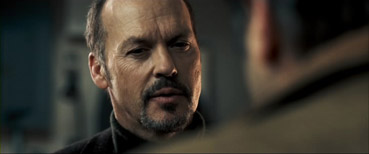
In truth, Frank looks more likely to be selling the newspapers reporting crimes rather than the man carrying them out, and therein lies his charm. Yes, charm. Frank Logan might go down as one of cinemas most charming hitmen. To Kate, Frank is just a good man, with an altruistic streak, so that's exactly what we see him as too. In a strange way, Frank Logan is a lot like a superhero – I won't say Batman, but Keaton aside, the pointers are there, the men on Frank's list aren't there arbitrarily – albeit a father unfantastical one. By day, he works as a tailor, holed away in the backroom of an upscale menswear store, and by night, he utilises that same meticulous efficiency to swiftly dispatch those he's ordered to kill. In between, he's Kate's superman, swooping in when she needs him, and watching over her when she doesn't.
Likewise, Kate isn't a cardboard cut-out battered wife. Though timid and somewhat girlish and times – especially when she receives male attention – she settles into her own skin and really thrives outside of the shadow of her husband's influence. Over time, she shows a strength all of her own, that's very different to Frank's hard, stoicism. Brave seems rather a trite term to use, but when you set eyes on husband Michael proper, you realise what a threat he could impose. There's a really nice visual differential between Carnivale and Macdonald that's played up during the scene to great effect.
The film's lighter moments recall classic screwball comedy, though it feels more like honest quirks of fate than a contrivance to create clichéd laughs, they work because they have an odd, quirky sensibility that could only be lifted from real-life expenses. Never did I think a friendship would be born out of someone rescuing someone else from under a fallen Christmas tree in the lobby of an apartment building. Until this film, that felt as likely as an abused wife finding common ground with a hitman. The humour here, like everything else, is subtle. In less skilled hands, the tonal shifts could have been glaringly obvious, the fact that they aren't underlines how well written Ron Lazzeretti's script is.
Lazzerretti isn't the only contributor to this production who excels. Given the independent roots of this project, the production values on show here are high. Originally Lazzerretti was set to direct, but the project ground to a halt when he fell ill. To stop it from folding altogether, an already heavily invested Keaton agreed to step in and take on the task, and his passion for the project clearly shows. Though a star name may be attached, Merry Gentleman is very much a collaborative film, and there's a real sense of balance, right from Edward Shearmur's beautiful score through to Chris Seager approach to composition and framing, which gives everything a ghostly yet magical feel, with the later quality being particularly reminiscent of his work on David Yates' The Girl in the Café (which incidentally also stars Macdonald in an age-gap romance, this time with Bill Nighy). However, no matter how much effort is put into making a film look, sound and feel right, when it's as heavily driven by character as this one is, you have to assemble a cast that can deliver the material, and more importantly in the case of a nuanced film like this, deliver correctly. If that doesn't happen, all that hard work will go to waste.
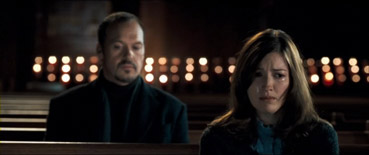
Luckily, there are no such issues here. I've always enjoyed Keaton's work, and the performance he turns in here is incredibly restrained, closer to his portrayal of recovering drug addict Daryl Poynter in Glenn Caron Gordon's Clean and Sober than the bigger, freewheeling ones he's renowned for. In his leading lady, Keaton hits the jackpot, Kelly Macdonald brings a great amount of depth, warmth and modesty to Kate, changing what could have been a rather flat, tragic figure into someone likable and relatable. It's great to see Macdonald in a more central role after so many consistently good supporting ones over the years, having most recently played a very different kind of wife as Carla Jean Moss in the Coen brothers' No Country for Old Men. Though she and Keaton look and sound rather an unlikely pair, they work incredibly well together, and their work here just shows how impressive their range is. The fact that the true nature of Kate and Frank's relationship just lends further meaning to the time they spend on screen, because you always wonder about the potential for more.
Yes, I know, it's all sounding terribly old-fashioned and not very cool, isn't it? Value in films is relative, and not just in the fiscal sense of the word. OK, so this film will never make take the quite frankly mind-boggling amount of money Avatar generated in box-office, but then it's not meant to either. In fact, I don't think The Merry Gentleman is meant to exist in post-millennial cinema at all. It reminded me a great deal of something Frank Capra would make, with the most obvious connection being It's a Wonderful Life. It almost feels strange to be watching it in colour and it wouldn't look out of place in a cinema playing during the height of Capra's powers. If you're willing to let action take a backseat, and allow acting and storytelling to the fore, then you'll be handsomely rewarded for your patience. It's a virtue long lost, much like films of this type.
As you might expect from a small scale DVD release from a big studio like Universal, the transfer is generally first rate – it's sharp, the contrast is well balanced, the black levels are inky and there's not a dust spot in sight. The colours are slightly muted, but deliberately so, reflecting the tone and mood of the drama. The image holds its integrity even in darker scenes.
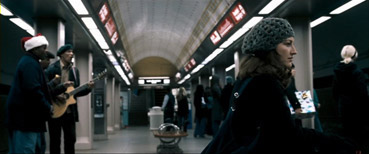
The Dolby 5.1 surround track is a low-key affair, boasting unsurprisingly crisp clarity and a good dynamic range, with the surrounds reserved for city loction sounds. There is some low frequency kick on some of the music, but even this is subtly handled.
Standard fare here with a making-of and a trailer, which seem light nowadays, given how chock-full some releases are. Call me greedy, but I think it would have been interesting to have a commentary track with Keaton on this, purely to gain his perspective upon the challenges of fulfilling the dual role of actor and director.
The Merry Gentleman: The Making of (15:53)
This is a good mix of excerpts from the film, handheld footage from the set (Keaton's only appearance in the supplemental material), and short filmed contributions with various key personnel, most frequently from scriptwriter Ron Lazzeretti and actor-producer Tom Bastounes. There's a nice focus on the production side of things, including some brief attention given to how project came to fruition. The length of this, and the vaguely segmented structure means there's not a great deal of room for insight, and it feels like the contributors get cut off before they can discuss anything in depth. However, it gives a broad overview of the production that is driven by discussion of the narrative and characters as opposed to being overladen with empty praise for the people involved, which is rather refreshing in itself.
Trailer (2:15)
Had I watched this in a cinema before seeing the film, I probably wouldn't have made the effort to see it, because it's horribly misrepresentative of Merry Gentleman actually is. On the plus side, it looks nice: the intertitles are integrated into the scenes, popping up at various junctures from above, below, behind or around things and are rendered in a rather fetching font. On the minus, what ruins this trailer is the editing, which chops and changes elements for different emphasis. Admittedly, it's not an uncommon practice, but sometimes it can be detrimental to the film itself and I think that's the case here. Presumably in an attempt to gain a wider audience, it's been crafted to look like a combination of Lost in Translation and American Beauty, instead of allowing the film to have an identity of its own and be judged on its considerable merits. I couldn't help but think of Thomas Newman's famed score for the latter film when I heard first few seconds of the trailer's music. If you want to take a look, it might be better to do so with the volume muted.
The Merry Gentleman is a skilfully made and acted film, that's surprisingly accomplished for a debut feature. Events play out with a beguiling subtlety thanks to the languid approach to pacing and Ron Lazzeretti's understated script. Though its difference from modern Hollywood might make it too antiquated for some, if you're looking for an intriguing, character-driven piece, then this is definitely worth your time.
|